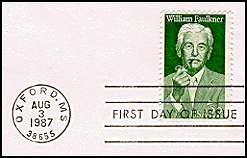
 Faux
Faulkner Faux
Faulkner
 Trivia Trivia
 Quotes Quotes
 Quizzes Quizzes
William Faulkner
Anecdotes and Trivia
Contents
|
A Patriarch's Professions
Faulkner’s great-grandfather, William Clark Falkner, died eight years
before William Faulkner was born, but nonetheless he dominated the lives
of all his descendants. During his life he was, in turns, a Civil War
soldier, a planter, a lawyer, a politician, a best-selling novelist (for
The White Rose of Memphis), and a railroad entrepreneur.
|
William Clark Falkner
 |
|
|
The Old Colonel's Ouster
W. C. Falkner's nickname was the "Old Colonel," for his rank
in the Civil War, and he was commended by Confederate General Joseph E.
Johnston for his courage in repelling the Union General Irwin McDowell's
final assault at the Battle of First Manassas. Nonetheless, he was
ousted from command by his troops the following year for being too
reckless. Undeterred, Falkner returned to Mississippi and raised a
regiment, the First Mississippi Partisan Rangers, to defend his
homeland.
|
|
Larger than Life
W. C. Falkner had a larger-than-life-size statue made of him in Carrara
of Italian marble in expectation that his grateful townspeople would
erect it in the town square of Ripley, Mississippi, to commemorate him.
The statue — eight feet tall and resting upon a base six feet square
and fourteen feet tall — was never erected in the town square as he
envisioned. Instead, it rests atop his grave, intact except for the
fingers of his right hand, which at some point were shot off.
|
|
Business Is Hell
Falkner died in the streets of Ripley in 1889 when his former business
partner shot him. Falkner had forced the partner, Richard J. Thurmond,
out of his railroad. In the subsequent trial, Thurmond was acquitted.
|
|
Young Colonel's War Record
William Faulkner’s grandfather, John Wesley Thompson (J.W.T.) Falkner,
was nicknamed the "Young Colonel," out of respect for his
father, the "Old Colonel," but the younger Falkner in fact
never fought in any war.
|
J.W.T. Falkner
 |
|
|
Bank Builder
J.W.T. Falkner, the first Falkner to live in Oxford, founded the First
National Bank of Oxford in 1910. The bank is still in operation today.
|
|
Career Dreams Dashed
William Faulkner’s father, Murry Falkner, had his career dreams dashed
when his father sold the family railroad in 1902. Murry had been working
for the railroad in Ripley and had hoped to inherit the railroad from
his father, just as his father had inherited it from the Old Colonel.
But when Murry went to a banker hoping to secure a loan to buy the
railroad, the banker laughed at him, thinking it was a joke that someone
would sell something so profitable as a railroad. Offended, Murry
stalked out, effectively ending his best chance to save the only job he
would ever love.
|
Murry Falkner
 |
|
|
Kindling Choppers
When Faulkner (then named "Falkner") was born in September
1897 in New Albany, Mississippi,
he was sick enough most nights that his mother, Maud, would rock him
steadily, not in a rocking chair but in a straight kitchen chair, and
the sound of the chair's legs could be heard through the open windows.
One neighbor said, "Those Falkners sure are the queerest folks.
They chop kindlin' all night on the kitchen floor."
|
|
An Early Start
Faulkner knew at an early age what he wanted to do with his life. When
he entered third grade (after having skipped second) and was asked what
he wanted to do when he grew up, he responded, "I want to be a
writer like my great-granddaddy."
|
|
Lynched!
One of William Faulkner’s most formative experiences happened in 1908
when a black man, Nelse Patton, was lynched on the square in Oxford. A
man named McMillan who was in the Oxford jail asked Patton, a trusty at
the jail, to take a message to his wife, Mattie. According to reports,
Patton made advances upon Mattie, which she refused, and when she
reached for a pistol to force him to leave, he slashed her with a razor
that nearly took her head off.
Patton was captured and returned to
the jail, and by sundown a crowd numbering in the hundreds had gathered
outside. A judge and several ministers had nearly convinced the throng
to let justice take its course, but then a friend of J.W.T. Falkner,
former U.S. Senator W. V. Sullivan, arrived and harangued the crowd, now
numbering nearly 2,000 people. Now a mob, the assembly managed to break
into the jail and shot Patton; they then dragged his body out, castrated
it, and mutilated the head. They tied a rope around Patton's neck and
dragged him behind a car to the square, where they hung his naked body
from a tree. The coroner's jury determined that Patton "came to his
death from gunshot or pistol wounds inflicted by parties to us
unknown."
|
|
Phil Stone
If any one person is responsible for Faulkner’s emergence as one of the
twentieth century's most gifted novelists, that honor would go to Phil
Stone. Four years older than Faulkner, Stone first noticed Faulkner in
the summer of 1914, after having earned a B.A. from Yale and learning
that Faulkner was writing poetry. After he had read Faulkner’s poetry,
Stone sensed his potential as a writer and took Faulkner as his protégé,
encouraging him in his pursuits and ambitions and instructing him in his
many interests, including literature, philosophy, and history.
|
|
Canada Cadet
When the United States entered World War I in 1917, Faulkner (still
spelled "Falkner" at this time) tried to enlist in the Army
Air Corps as a pilot. When he was rejected for being too short, he
decided to spell his name "Faulkner" and adopted a British
persona, even affecting an English accent, hoping to join the Royal Air
Force in Canada. He was accepted and reported for duty in Toronto on
July 9, 1917.
Nevertheless, he never flew in combat.
When the war ended on November 11, 1918, Cadet Faulkner was stationed at
the School of Military Aeronautics in Toronto in the third and final
phase of pre-flight training. He returned home to Oxford in December
1918, having never left North America for the skies over Europe.
|
William Faulkner in 1918
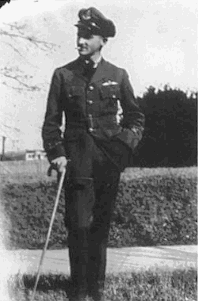 |
|
|
A Plate in His Head
Even though Faulkner never flew in combat during the war, that didn't
prevent him from suggesting that he had. He returned to Oxford in
his R.A.F. uniform sporting wings that he had purchased in New York City
and with a limp he claimed he had suffered in a crash during training.
The tales he told varied — on occasion he claimed he had suffered a
skull fracture that had left him with a silver plate in his head and
lingering pain, and when listeners assumed that he had incurred his
"injuries" in the skies over France, he did little to dissuade
their beliefs. Some of his tales of injuries even made it into later
biographical notes accompanying his novels.
|
|
The Card-Playing Postmaster
Faulkner’s most notorious stint as a working man was his role of
postmaster at the University of Mississippi post office, which
incredibly he held for nearly three years. By all accounts, he was a
terrible postmaster — he would ignore patrons calling at the window,
he delayed taking outgoing mail to the train station, and on occasion he
even threw away mail. He spent much of his time in the post office
writing, and other times he would play bridge and mah-jongg with friends
whom he'd appointed as part-time clerks. When a postal inspector came to
investigate, Faulkner agreed to resign. Later, Faulkner said about his
experience: "I reckon I'll be at the beck and call of folks with
money all my life, but thank God I won't ever again have to be at the
beck and call of every son of a bitch who's got two cents to buy a
stamp."
|
|
The Ousted Scoutmaster
At the same time Faulkner was working as postmaster, he also volunteered
as a scoutmaster for the Oxford Boy Scout troop — but he was relieved
of his duties because of his drinking.
|
|
Sherwood Anderson
Besides Phil Stone, Faulkner’s other literary mentor was Sherwood
Anderson, author of Winesburg, Ohio, whom he met in New Orleans
in 1925 through Anderson's wife. Anderson encouraged Faulkner in several
ways, most notably in his instruction for him to write about the region
he knew in Mississippi (see introduction to The
Library). Anderson also played a crucial, if hurtful, role in
having Faulkner’s first novel, Soldiers' Pay
published; Anderson agreed to recommend the novel to his publisher,
Horace Liveright, if Anderson did not have to read it.
|
|
Dark Houses
Faulkner twice used "Dark House" as a working title for a
novel in progress, and both times he changed it for a more
impressionistic title. The first novel had originally begun with a
character named Hightower
and his bride arriving at a church in Jefferson.
Later, however, Faulkner made another start, "knowing no more about
it than a young woman, pregnant, walking along a strange country
road." One afternoon in August, Faulkner and his wife Estelle were
having a drink on the east gallery of Rowan
Oak. Estelle looked across the grass to the bushes, bathed in the
afternoon sunlight, and to the sunken garden in the shade beyond, and
said, "Bill, does it ever seem to you that the light in August is
different from any other time of the year?" A little while later,
Faulkner rose, said, "That's it," and walked into the house. A
few minutes later, he returned without explanation. He had gone to his
worktable, struck out "Dark House," and substituted "Light
in August." Later, Faulkner said he used that title because
"in my country in August there's a peculiar quality to light and
that's what that title means." (Blotner, Faulkner: A Biography,
Rev. ed., pp. 280-81)
The second novel, bearing the working
title "A Dark House," began from "Evangeline,"
a story that he had first begun in the mid-1920s, which involved two
young Americans, twenty-three-year-old Don and a twenty-two-year-old
narrator, attempting to solve a murder mystery having to do with a
plantation owner named Colonel
Sutpen and his children. In 1933 Faulkner had approached the
material through a different character, Wash
Jones, a poor white who "looked after" Colonel Sutpen's
plantation while Sutpen has been away fighting the war. The story,
"Wash," was published in Harper’s.
Faulkner began writing A Dark House
in February 1934, substituting two characters named Chisholm and Burke
for the narrator and Don of "Evangeline."
After several false starts, he hit upon using a character who had
previously appeared in The Sound and the Fury,
Quentin Compson, first
telling the story to his Harvard roommate, Shreve,
then as the recipient of a letter from his father
dated January 12, 1910, which began, "My dear son, Miss Rosa
Coldfield was buried yesterday. She had been in a coma for about a
week and two days ago she died without regaining consciousness...."
Mr. Compson's reflections on death lead to a flashback in the home of
Rosa Coldfield, Sutpen's sister-in-law. The murder mystery that had
first arisen nearly a decade before in "Evangeline"
would fall primarily on Quentin's (and Shreve's) shoulders, but it would
also be explored by other characters as well. The novel was published as
Absalom, Absalom!, and it would take
Faulkner another two years before he finished writing it. (Blotner, Faulkner:
A Biography, Rev. ed., pp. 176, 324-27)
|
|
C
o
l
o
r
e
d
Ink
When he was trying to get The Sound and the Fury
published, Faulkner suggested using colored ink as a means of
delineating the multiple time periods represented in Benjy's
section rather than simply indicating a shift in time with italics,
but he was told publishing was not advanced enough to accomplish it.
|
|
A "Cheap Idea"...
Faulkner wrote in the introduction to Sanctuary
— one of the few introductions Faulkner ever wrote for his novels —
that the book was "a cheap idea, because it was deliberately
conceived to make money." Though Faulkner did not want the
introduction published in future editions of the novel, in a sense he
was right, since Sanctuary was his only bona-fide bestseller at
the time of first publication, and fifteen years later — when Malcolm
Cowley's edited version of The Portable
Faulkner was published — it was the only Faulkner book not out
of print. Faulkner’s comments would have the unfortunate effect of
convincing critics to accept the book at face value, ignoring the
novel's obvious skill and craftsmanship as well as its exploration of
"Faulknerian" themes.
|
|
...But Not Too Cheap
Faulkner may have called it a cheap idea, but ultimately it was costly.
He wrote the manuscript for Sanctuary
immediately after The Sound and the Fury
and sent it off to his publisher, who said of the novel's lurid subject
matter, "Good God, I can't publish this. We'd both be in
jail." Faulkner then wrote As I Lay Dying,
which was published, and late that year received the galley proofs of Sanctuary.
Reading through them, and realizing how badly written the novel was, he
chose to rewrite numerous parts of the novel, sharing the cost of such
an immense change with the firm. The cost of revising the novel came to
$270 for Faulkner, "at a time," he said, "when I didn't
have $270.00" (Blotner, Faulkner:
A Biography [1984] 268-70).
|
|
On Eagles' Wings
In Faulkner’s first Yoknapatawpha
novel, Sartoris, the epitaph he had
chosen for John Sartoris, a pilot who dies in the novel, was "I
bare him on eagles' wings and brought him unto me." In 1935, when
Faulkner’s youngest brother, Dean Swift Faulkner, died crashing the
airplane Faulkner had sold to him, the same epitaph was used on his
gravestone.
|
|
Like a Brother
Faulkner felt tremendous guilt over the death of his brother Dean: he
had sold the airplane to Dean, and he had encouraged him in his flying.
At the time of Dean's death, Faulkner was writing Absalom,
Absalom!, a novel in which the central mystery concerns the
murder of a brother by his brother.
|
|
Church Related
According to Faulkner’s nephew, James Faulkner, the church which Thomas
Sutpen "rode fast to" — and in which he was married — in Absalom,
Absalom! is the same church, College Hill Presbyterian Church,
in which Faulkner married Estelle Oldham Franklin in 1929.
|
|
Col. Dickey's Kindness
The first Union cavalry officer to arrive in Oxford
during the Civil War was a "Col. Dickey," who demonstrated an
act of kindness to the "Widow Sample" for teaching the
children of her 100 slaves to read — he returned to her six mules and
a wagon earlier taken by Union troops and gave her a wagonload of salt
from Union stores. In The Unvanquished,
the name of the Union commander who ordered the return of Rosa
Millard's silver (not to mention her mules and slaves) was named Colonel
Nathaniel G. Dick (Hinkle
and McCoy 112-13).
|
|
Benjy's Brother?
The Compson home in The
Sound and the Fury was based on the Chandler
House in Oxford, a few blocks away from Faulkner’s childhood home.
Faulkner’s first-grade teacher, Miss Chandler, lived there with her
family, which included a mentally retarded brother who may have been a
model for Benjy Compson.
|
Photo by John B. Padgett
The Thompson-Chandler House
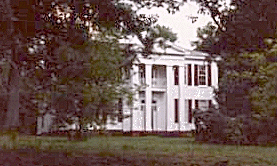 |
|
|
Barton Fink and Bill Faulkner
Joel and Ethan Coen's 1991 film Barton Fink, which depicts the
story of a "serious" writer who hesitantly accepts a lucrative
Hollywood screenwriting job in the 1940s, features a character
conspicuously modeled on William Faulkner: Bill Mayhew, a Southern
novelist (America's greatest living novelist, according to Barton Fink)
who is having an affair with his secretary. Mayhew, played by John
Mahoney, bears a strong resemblance to William Faulkner, who himself had
taken up screenwriting in Hollywood to make
ends meet. However, there are other parallels in the film between
Faulkner and the title character: like Faulkner, Barton Fink's first
screenwriting job is to write a wrestling picture for Wallace Beery.
|
Faulkner in Hollywood
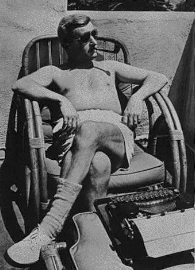 |
|
A Mickey-Mouse Job
When Faulkner first went to MGM to work as a screenwriter in 1932, he
volunteered to Story Department chief Samuel Marx to write not feature
films but two types of movies he claimed he was most familiar with:
newsreels and Mickey Mouse cartoons.
|
|
Homework
According to Hollywood legend, Faulkner went to the studio boss and
asked if it would be all right for him to work at home. The studio boss
said okay. Later, someone tried to reach him at his Hollywood apartment,
to no avail. Finally, they realized "home" for Faulkner meant
Oxford, Mississippi. (In fact, Faulkner had gained permission to work in
Oxford.)
|
|
Studio Directive
While working for MGM in Oxford, Faulkner received a directive to fly to
New Orleans to work on dialogue for a picture called Louisiana Lou,
which was being filmed there. As Faulkner says, "I could have got
on a train in Oxford and been in New Orleans eight hours later, but I
obeyed the studio and went to Memphis, where an airplane occasionally
did leave for New Orleans. Three days later one did."
|
Clark Gable
 |
|
Clark Who?
In 1932 Faulkner went dove hunting with Howard Hawks and a friend of
his, an actor named Clark Gable. Hawks began talking with Faulkner about
books, during which Gable remained silent. Finally, Gable asked Faulkner
who he thought were the best living writers. After a moment, Faulkner
answered, "Ernest Hemingway, Willa Cather, Thomas Mann, John Dos
Passos, and myself."
Gable paused for a moment and said,
"Oh, do you write?"
"Yes, Mr. Gable," Faulkner
said. "What do you do?"
|
|
A "Nobel" Achievement
Faulkner’s film adaptation of Ernest Hemingway's novel To
Have and Have Not marks the only time in film history that two
Nobel Prize winners, Faulkner and Hemingway, were associated with the
same motion picture.
|
|
The Butler Did It...Or Did He?
What is probably Faulkner’s greatest screenwriting triumph, The
Big Sleep, was borne out of confusion that extended even to the
source material. As Director Howard Hawks recalled, "It was
basically an entertaining film, even though I could never figure out who
killed who." When someone asked Hawks who killed the man whose car
was fished out of the river, Hawks said he didn't know, so he asked
Faulkner. Faulkner didn't know either, so Hawks asked Raymond Chandler,
the author of the detective novel on which the movie was based.
Chandler jokingly responded with the
old cliché from stage melodrama, "The butler did it." To
which Hawks replied, "Like hell he did; he was down at the beach
house at the time."
|
William Faulkner at the Nobel ceremonies with Dr. Gustaf Hellström
and Envoy Ståhle
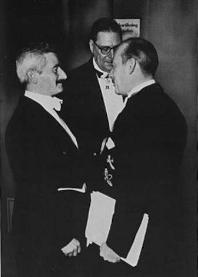 |
|
A Timely Award
William Faukner was awarded the Nobel Prize for Literature for 1949,
but he did not actually receive the award until 1950 because the
Nobel committee could not reach a decision in time. The initial list of
candidates included Hemingway, Steinbeck, Pasternak, Sholokhov, Mauriac,
and Camus. Though the list was narrowed down to Sir Winston Churchill, Pär
Lagerkvist, and Faulkner, with the voting eventually swinging in
Faulkner’s favor, it did not happen in time for the prize to be awarded
that year.
|
|
A Farmer in Sweden
When Faulkner was informed that he had been chosen to receive the Nobel
Prize, Faulkner did not want to go to Stockholm to receive it. He told a
Swedish reporter, "I won't be able to come to receive the prize
myself. It's too far away. I am a farmer down here and I can't get
away." His wife, Estelle, eventually persuaded him to go when she
told him their daughter, Jill, wanted to go. In reality, Jill was not at
all anxious to go, but Faulkner did not know this and eventually
capitulated.
|
|
Nothing to Wear
Faulkner was unwilling to buy a new suit to wear when he received the
Nobel Prize, so he rented one. Afterwards, he told his publisher,
Bennett Cerf, that he wanted to keep the suit. When asked what he would
do with it, Faulkner said, "Well, I might stuff it and put it in
the living room and charge people to come in and see it, or I might rent
it out, but I want that suit." Random House bought the suit for
him.
|
|
Seen, Not Heard
When Faulkner delivered his Nobel Prize speech,
no one could understand what he said — he stood too far from the
microphone, and his Southern accent and rapid delivery made it even more
difficult to understand what he was saying. But when they discovered
what he said the next morning, the impact was tremendous. For years
afterward, according to one scholar, Faulkner’s speech would be recalled
as the best speech ever given at a Nobel dinner.
|
More to come soon!
Top of Page
|
